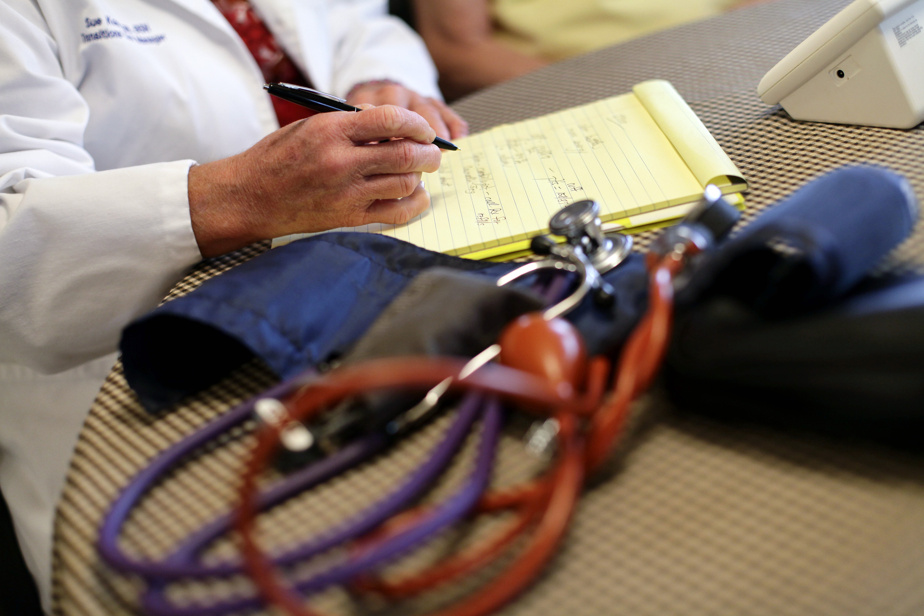
Fewer than 500 Quebecers have received care from specialized nurse practitioners (IPS) since they gained the right to register patients in their own names in mid-April. A number that seems small considering that 640,000 people are at the counter for access to a family doctor.
What is there to know?
- From April 15, Specialist Nurse Practitioners (SNPs) will be able to register patients under their own name in the same way that family doctors do.
- As of June 11, the 13 IPS treated a total of 482 patients, according to the Régie de l'assurance santé du Québec (RAMQ).
- This low number is particularly explained by the fact that this new type of registration is currently only allowed in IPS clinics of the network and not in GMFs.
According to the Régie de l'assurance santé du Québec, as of June 11, 13 IPS had registered a total of 482 patients.
A statistic that comes as no surprise to the Association of Specialized Nurse Practitioners of Quebec (AIPSQ). As of now, this new type of registration is only possible at 12 IPS clinics and service points in the network. According to the Ministry of Health and Social Services (MSSS), about thirty IPS work there full-time.
“We are eagerly awaiting Phase 2 [du projet] So that IPS can enroll directly in GMF,” said AIPSQ President Maude Raymond. In Quebec, 1060 IPS provide front-line services, according to the MSSS. “More than 80% are in GMF,” she estimated.
According to Maud Raymond, an “administrative barrier” also prevents the treatment of large numbers of patients: IPS must see a patient before enrolling.
Family doctors receive a list of patients from the Access Desk and have a maximum of one year to provide a first consultation for a vulnerable person and three years in the case of a non-vulnerable patient.
“For IPS, there is no such mechanism,” laments Maud Raymond. Does the patient really need to be seen on June 14th? [par exemple] For registration? At that time we had little contact. »
Another “big stone in the shoes” of front-line IPS: they lacked the power to assess and diagnose mental health disorders, recalls Maude Raymond. If the patient is depressed, these professionals must refer to a doctor or mental health NP. “Once a treatment plan is created, the IPS can adjust the molecule, follow it, and stop it from working,” she explains.
Responses from the Ministry of Health
MSSS indicates that the number of registrations through IPS will increase as clinics open – a thirteenth will open in the national capital in the fall – and positions are filled. According to the MSSS, an “experienced NP practicing full-time in a clinic” may care for 1,000 patients.
The ministry said it was working “in collaboration with RAMQ” to allow IPS to take care of batches of patients without IPS prior visit. “However, there are several steps to come and the due dates are unknown to MSSS at this time,” we wrote in the email.
And registration through IPS in GMFs? This will be possible in the “next expansion phases” of the project, the ministry responded. “Necessary discussions on this issue are ongoing. »
Specifically regarding the enrollment of patients through IPS in the GMF, the Federation of General Practitioners of Quebec (FMOQ) asked to respond, “Negotiations with the government on the renewal of the framework agreement will begin in Quebec soon. ”. However, the union insists that mass registration remains a “necessary way” because “Quebec has a shortage of 1,500 family doctors.”
“Accountability” issues according to FIQ
The Quebec Interprofessional Health Federation (FIQ) considers the registration of patients by NPs to be “good recognition” of their autonomy. But it raises questions of “accountability and responsibility,” according to its vice president, Jerome Rousseau. He recalled that IPSs are employees and not self-employed like doctors.
“For example, if an NP has to be absent due to illness, maternity leave or a change of location, how do we monitor the patients on their behalf? He asks. Is it the professional who has to ensure follow-up herself or the company she works for? »
More than 31,000 consultations
According to the data collected, IPS has provided at least 31,600 consultations to patients at 12 IPS service points in the network since the opening of the first clinics in December 2022. Press and obtained from health institutions.
According to Regis Blais, a professor in the department of management, evaluation and health policy at the University of Montreal's School of Public Health, it's a “welcome addition,” but it remains a “minimum.” “Any initiative that gives the network a little breathing room is a good thing,” he said. But it is not an oxygen tent. »
NPs practice full-time in clinics. But others work there on a “voluntary basis,” for example, one day a month, health organizations suggest. New locations opening soon.





